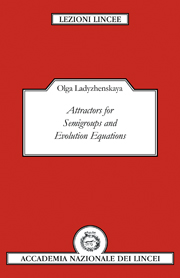Book contents
- Frontmatter
- Contents
- Preface
- Part I Attractors for the semigroups of operators
- Part II Semigroups generated by evolution equations
- 5 Introduction to Part II
- 6 Estimates for the number of determining modes and the fractal dimension of bounded invariant sets for the Navier-Stokes equations
- 7 Evolution equations of hyperbolic type
- References
- Index
5 - Introduction to Part II
Published online by Cambridge University Press: 19 January 2010
- Frontmatter
- Contents
- Preface
- Part I Attractors for the semigroups of operators
- Part II Semigroups generated by evolution equations
- 5 Introduction to Part II
- 6 Estimates for the number of determining modes and the fractal dimension of bounded invariant sets for the Navier-Stokes equations
- 7 Evolution equations of hyperbolic type
- References
- Index
Summary
In Part II we consider abstract semi-linear evolution equations mainly of hyperbolic type. They generate semigroups of class AK. Evolution equations of parabolic type generate semigroups of class K. We devote to them only the short Chapter 6, as semi-linear parabolic equations are expounded in a comparatively complete literature. Many publications are devoted to the Navier-Stokes equations which generate (in the two-dimensional case) semigroups of class K. In the first publication on this subject [1] the set M of all limit states or, which is the same, the minimal global B-attractor was found; among its properties the most interesting one is a finiteness of the dynamics {Vt} on M (or alternatively, the finiteness of the number N1 of determining modes). Here we give some comparatively recent results [11] concerning majorants for the number N1 and for the fractal dimension of invariant bounded sets which are better (for small viscosity v) than before. On the other hand, quasi-linear parabolic equations of general form also generate semigroups of class K, but the presentation of this material requires a separate publication. For this purpose we need to use results on the global unique solvability of boundary value problems for these equations and estimates of a local type. They may be found in the monograph [15]; more recent results are described in the survey [16], which also contains a list of publications. It is, nevertheless, necessary to put this subject in the framework of the theory of semigroups choosing the phase spaces correctly.
- Type
- Chapter
- Information
- Attractors for Semi-groups and Evolution Equations , pp. 37 - 38Publisher: Cambridge University PressPrint publication year: 1991



